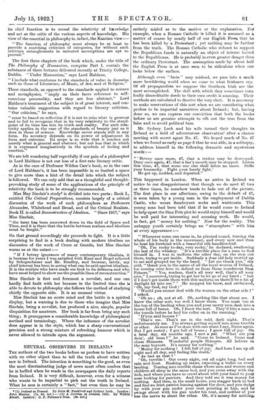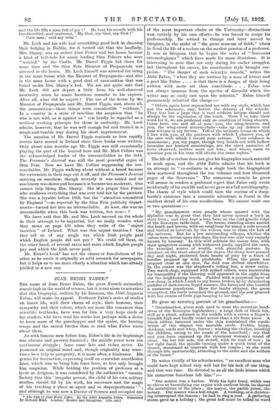NEUTRAL OBSERVERS IN IRELAND.* Tux authors of the two books
before us profess to have written with no other object than to tell the truth about what they taw in Ireland. The intention is something to the good, as even the most discriminating judge of news must often confess that he is baffled when he reads in the newspapers the daily reports from Ireland. It is very difficult, however, even for a witness who wants to be impartial to pick out the truth in Ireland. What he sees is certainly a "fact," but even then he may be
• (1) Ireland in Travail. By Joke If. Nankivell and Sydney Loch. London : John Murray. (7e. ad. net.]—(2) A Journey in Ireland, 1921. By Wilfrid
Ewalt. London: Putnam'a Sons. [fa. net.]
entirely misled as to the motive or the explanation. For example, when a Roman Catholic is killed it is assumed as matter of course by nearly half of our English Press that he has been killed by a Protestant ; yet nothing may be further from the truth. The Roman Catholic who refuses to support the Republican funds is naturally an object of intense hatred to the Republicans. He is probably in even greater danger than the ordinary Protestant. The assumption made by about half the English Press is at once seen to be ridiculous when one looks below the surface.
Although even " facts " may mislead, we pass into a much more bewildering world when we come to what Irishmen say. Of all propagandists we suppose the Southern Irish are the most accomplished. The skill with which they sometimes turn foully discreditable deeds to their own credit is amazing. Their methods are calculated to deceive the very elect. It is necessary to make reservations of this sort when we are considering what profess to be impartial narratives about Ireland ; but, having done so, we can express our conviction that both the books before us are genuine attempts to sift out the true from the false and to avoid political bias.
Mr. Sydney Loch and his wife turned their thoughts to Ireland as a field of adventurous observation'. after a chance meeting with secret agent No. 47. We hoped much of No. 47 when we found as early as page 5 that he was able, in a soliloquy, to address himself in the following dramatic and mysterious words :-
" Betray once more, 47, that a traitor may be destroyed. Deny once again, 47, that a liar's mouth may be stopped. Listen this time, 47, that some one else shall listen no more. Stifle your humanity. Fight your lonely fight.' He got up, nodded, and departed."
This happened in London. When vge arrive in Ireland we notice to our disappointment that though we do meet 47 two or three times, he somehow tends to fade out of the picture. The first place in our affections, owing to the default of 47, is soon taken by a young man in the employment of Dublin Castle, who wears flamboyant socks and waistcoats. This young man had been told that if he would come to Ireland to help upset the Sinn Fein plot he would enjoy himself and would be well paid for interesting and amusing work. He would, in fact, get " money for nothing." Now for the reality. The unhappy youth certainly brings an " atmosphere " with him at every appearance :-
" Whenever some one came in, he pivoted round, turning the whole of his body in the movement, and every now and then he beat his forehead with a beautiful silk handkerchief.
' Oh, I'm rocky to-day, very rocky,' he declared, swallowing the last of the whiskey. It's a terrible place for a man to find himself in. I was in uniform the other day, on the step out there, trying to get inside. Suddenly a dear old lady trotted up to me and grasped me by the hand. " Let me thank you," she said, " thank you in the name of all the loyal women of Ireland, for coming over, here to defend us from those murderous Sinn Feiners." " Yes, madam, that's all very well, that's all very nice," I answered,rtrying to get her to let go of my hand ; " but if I don't get inside there with this uniform on there'll be a bit of daylight let into me." ' He mopped his brow, and exclaimed, ' Oh, my God, my God ! '
Would you sooner deal with the women on the other side 1 ' I asked.
Oh no ; oh, not at all. Oh, nothing like that about me. I know the other sort, too well I know them. You meet 'em at the top of the landing when you and your merry men dash into a house full of beans. Oh, I know the sort. They'd bite a man in the tonsils before he had his collar on in the morning.'
D'you raid houses ? '
That's me. That's me in the cold, dark night. That's unfortunately me. I'm always getting myself into some trouble or other. As soon as I've done with one stunt I say, Never again. But I get rested ; I get full of beans ; I grow full of joy. On a fatal day, six months ago, I met a pal. " What are you doin', old bean ? " he said. " Come to Ireland. Come and chase Shinners. Wonderful people Shinners. All believe in the soap boycott. It's money for nothing."
Money for nothing I I felt full of joy. And here I am up all night and all day, and feeling like death.' As bad as that ? '
Oh, terrible I Out every night, out all night long, hail and rain and frost. Rushing up stairs, expecting a bullet on every landing. Tearing into terrible slums where men and women and children all sleep in the same bed, and you come away with the itch, and where you have to crawl about with your hand to your nose looking for patriots. And they told me it was money fot nothing. And then, in the small hours, you stagger back to bed and find an Irish patriot leaning against the door, and you dodge by with your gun under your coat pointing at him, and he swings about with his gun under his coat, and neither of you has the nerve to shoot the other. Oh, it's money for nothing, and the life fills a man full of joy 1' Ho beat his mouth with his handkerchief, and muttered, ` My God, my God, my God ! ' ' Poor man,' said my wife."
Mr. Loch and his wife had astonishing good tuck in choosing their lodging in Dublin, for it turned out that the landlady, Mrs. Slaney, was an ardent Sinn Feiner and her house became a kind of bolt-hole for many leading Shin Feiners who were " wanted " by the Castle. Mr. Darrel Figgis hid there for some time and the Sinn Fein Minister of Propaganda was arrested in the house. Mr. Loch himself was arrested for being in the same house with the Minister of Propaganda—and also in the same house with a good deal of ammunition that was found under Mrs. Slaney's bed. We are not quite sure. that Mr. Loch did not depart a little from his well-observed neutrality when he made facetious remarks to his captors. After all, what did he expect ? The use of the house by the Minister of Propaganda and Mr. Darrel Figgis, and, above all, the ammunition—these things were considerable " evidence." In a country in a state of rebellion the suspicion that " he who is not with us is against us " can hardly be regarded as a ruthless working principle for those in authority. Mr. Loch admits, however, that he was well enough fed and treated in a rough-and-tumble way during his short imprisonment.
The mention of Mr. Darrel Figgis reminds us how rapidly events have moved in Ireland since these books were written. Only about nine months ago Mr. Figgis was still occasionally playing the part of the hunted hero and Mr. Mick Collins was the acknowledged leader of the irreconcilables in the field. The .Freeman's Journal was still the most powerful organ of Sinn Fein. Now we have Mr. Collins suppressing the irre- concilables, Mr. Figgis walking about without a beard because the extremists in their rage cut it off, and the Freeman's Journal carrying on soniehow, though recently it was raided and its machinery was destroyed because it is became too moderate. One cannot help liking Mrs. Slaney. She ire a proper Sum Feiner who swallows everything that was ever told her by the patriots. She was a loyalist before 1916, but the " atrocities committed by England "—as reported by the Sinn Fein publicity depart- ments—turned her into an irreconcilable. At least, she was an irreconcilable when this book was written, but now— ?
We have said that Mr. and Mrs. Loch succeed on the whole in their attempt to be impartial, but we really wonder what they mean on page 150 when they write of the " unjust taxation " of Ireland. What was this unjust taxation ? Can they tell us of any single tax which Irish people paid which English people did not pay ? We could tell them, on the other hand, of several taxes and rates which English people pay and which the Irish never paid.
Mr. Ewart's book2 has not the charm or fancifulness of the other as he wrote it originally as solid research for newspapers, but it helps us to see more clearly a situation which has already yielded to a new one.



































 Previous page
Previous page